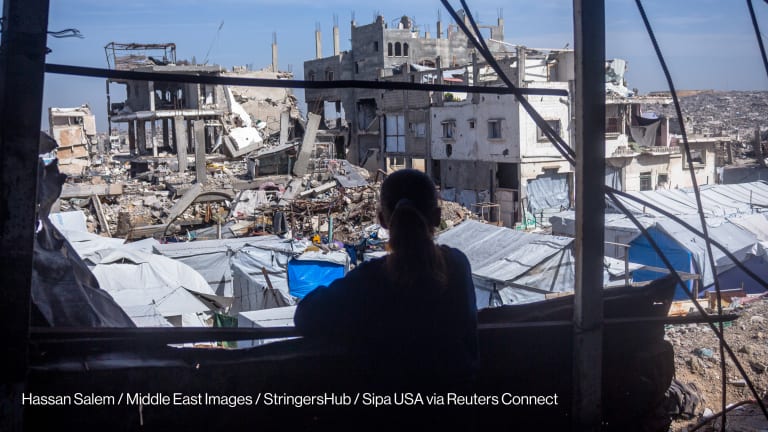
WASHINGTON — Amid a standoff over aid delivery into Venezuela, humanitarian organizations are refraining from taking political positions that could jeopardize getting aid to the people who need it most.
The Venezuelan military, acting under orders from President Nicolás Maduro, is currently blocking humanitarian assistance from entering the country via the Colombian border. But the U.S. Agency for International Development announced in a release on Wednesday that it is procuring and prepositioning assistance requested by the government of interim President Juan Guaidó, whom the U.S. and much of the international community recognize as the legitimate leader of the country.
“We live in a world of social media ... they’re well aware that there is aid being prepositioned on the other side of the border.”
— Nancy Lindborg, head, U.S. Institute for Peace“We will be moving aid to the border of Venezuela in the hope — and there is some aid there now — in the hope that we will be able to get it in. I don’t think that we, or the Colombians, or the Brazilians, or anyone else is planning to try to force it in,” U.S. special envoy for Venezuela Elliott Abrams told reporters Thursday. “Let it in. That’s all we’re asking.”
While Abrams said he hopes aid gets across the border “as soon as that is safe and logistically possible,” the fluid situation and disputed control of the Venezuelan government leaves NGOs without clear authorization to deliver assistance — and stuck in the middle of an escalating international political fight.
Global humanitarian organization CARE International, for example, is strictly politically neutral and does not take a position on who should control Venezuela, said Sheba Crocker, vice president of humanitarian policy and practice at the INGO.
“What is particularly worrisome to watch from this vantage point is the … politicization of the provision of humanitarian assistance,” said Crocker, former State Department assistant secretary for international organization affairs. CARE is providing assistance where it can and is closely monitoring the situation of people who are most in need, she said.
The International Committee of the Red Cross, which has a small presence inside Venezuela, said it also intends to remain strictly politically neutral: “As we know from experience working in different and highly complex contexts, the ICRC´s posture of neutrality pays off, as it enables our teams in the field to access affected populations and respond to their needs whilst reminding all stakeholders that this is the priority,” ICRC said in a statement.
Mercy Corps, which currently works with Venezuelan refugees in Colombia but is not operating inside Venezuela, said that it supports efforts to increase humanitarian access inside the country, but emphasized that aid should not be used as a political tool, a Mercy Corps spokesperson told Devex.
“It is also important that decisions around who receives aid, and in which locations, are not influenced or controlled by security forces or political actors, but are instead guided by the level of need and don’t put the people receiving it in danger,” the Mercy Corps spokesperson continued. “Our expectation is that aid deliveries are monitored to ensure the highest possible levels of accountability, in line with internationally accepted standards.”
The U.N. Office for the Coordination of Humanitarian Assistance currently has a small team inside Venezuela assessing the state of the current response and measuring the remaining need, said OCHA head Mark Lowcock at an event in Washington, D.C. on Tuesday.
OCHA’s programming is focused on nutrition and health services, done in consultation with the Maduro government. This is required by OCHA’s mandate, Lowcock said, while acknowledging that the organization is also tasked with engaging other actors, including Guaido.
“We’re forever threading a needle between, on the one hand, the fact that we’re required to consult with the authorities — we can only do things to the extent that is possible through that consultation — and on the other hand, we can only do things if someone will give us the money to do them,” Lowcock said in response to a question from Devex.
“Hopefully there will be successful navigation of all the pressures and all the politics of this so that we do get a stronger focus on people who are suffering a lot and who deserve support,” he said.
The politicization of aid in Venezuela is part of a troubling trend seen recently in conflicts around the world, where humanitarian aid is used as a bargaining chip, said Nancy Lindborg, former assistant administrator at the USAID Bureau for Democracy, Conflict and Humanitarian Assistance.
U.S. humanitarian assistance is normally triggered by a request from an ambassador in-country, along with host country permission, Lindborg said. She pointed to the access corridor in Syria created by a U.N. resolution in 2014 as an example of how the international community can coordinate to reach civilians in need when a government has not expressly consented to aid delivery or where control of a government is disputed. That resolution created the legal basis to deliver aid across the border in locations not controlled by Syrian President Bashar al-Assad.
But in Venezuela, “There are no good options in this situation as we go into a humanitarian meltdown,” said Lindborg, who now heads the U.S. Institute for Peace.
The international community must also be cautious not to create chaos at the border if it cannot get into Venezuela, and instead, make aid available on the Colombian side, Lindborg said.
“At some point it will probably be up to the Venezuelans who have already taken to the streets to express their unhappiness and their pain with the current government,” Lindborg said. “We live in a world of social media. I think they’re well aware that there is aid being prepositioned on the other side of the border.”
Search for articles
Most Read
- 1
- 2
- 3
- 4
- 5








